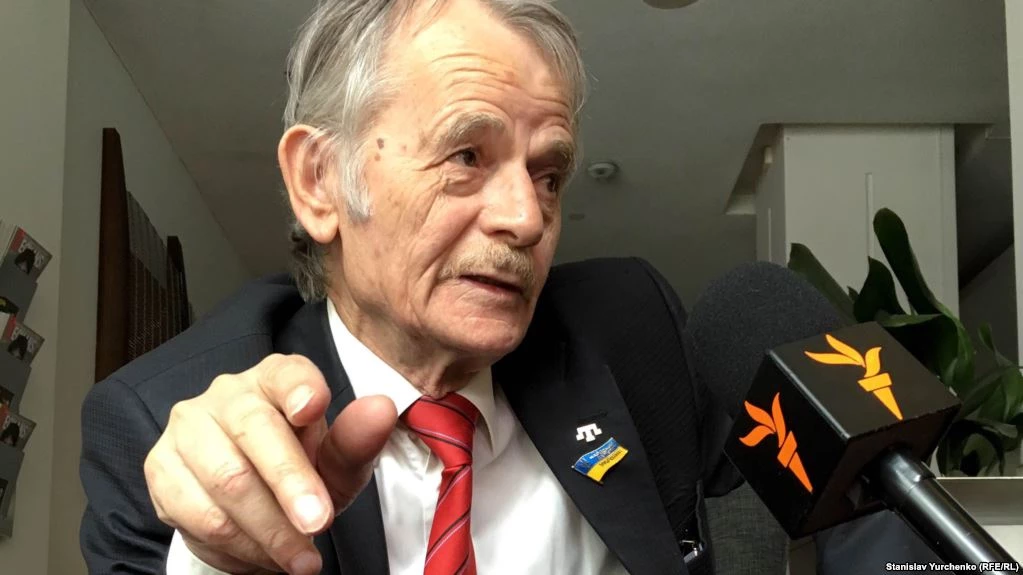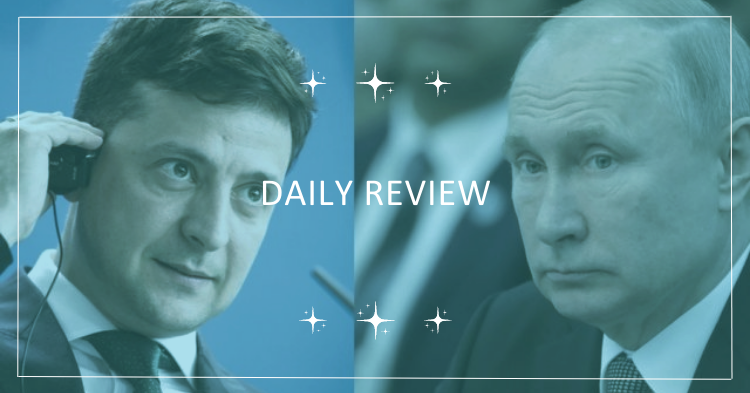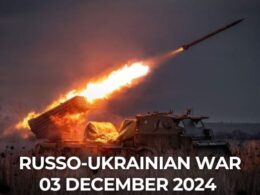Past 24 hours in the war zone
- Ukraine’s Joint Forces Operation Staff reported no attacks by Russian-hybrid forces.
- As of 19:30 Feb 2, OSCE SMM recorded 292 violations in Donetsk Oblast; 114 in Luhansk Oblast.
- Commander-in-Chief Valeriy Zaluzhny says Ukrainian army was not planning to attack occupied territories of Donbas and Crimea.
News flash
- German Chancellor Olaf Scholz will meet with Russian President Vladimir Putin to discuss matters related to Ukraine, reports ZDF.
- Ukraine's President Zelensky agreed to meet with Russia's President Putin in Türkiye, CNN Turk reports with reference to the statement by Türkiye's President Recep Tayyip Erdoğan. Putin’s speaker Dmitry Peskov responded that it is possible but first, an understanding on the desired issues and results of negotiations must be achieved, Russia Interfax reports.
- Polish Sejm adopted a resolution calling on NATO and EU member states to provide wide-ranging aid to Ukraine amid rising tensions with the Russian Federation, the Parliament of Poland wrote on its Twitter.
- Ministry of Reintegration of Temporarily Occupied Territories of Ukraine is negotiating with the Apple office in Kyiv to add a Crimean Tatar language based on Latin graphics to iOS keyboards by default, Ukrinform reports. Crimean Tatars are the indigenous people of Russia-occupied Crimea.
- Russia and China have claimed a united front against NATO expansion. Russian and Chinese leaders Putin and Xi Jinping made a statement after meeting at the opening of the Olympic Games, Kremlin's press service. China supported Russia’s "security guarantees" with regard to NATO's non-expansion. They accused NATO of "inflating antagonism and confrontation."
- YouTube blocked a number of channels related to self-proclaimed Russia-controlled "Donetsk People's Republic" and "Luhansk People's Republic," quasi-states located in the Donbas region of eastern Ukraine, ZN.ua reports.
Hungary blocked Ukraine’s accession to NATO cyber defense center
It has surfaced that Hungary was the NATO Ally responsible for blocking Ukraine’s accession to the NATO Cooperative Cyber Defence Centre of Excellence (CCDCOE), an institution Kyiv keeps seeking closer ties with following the recent cyberattacks, even after the official rejection of Ukraine’s membership status last year.
Hungary blocked Ukraine’s accession to NATO cyber defense center
Amid Russian war scare, a “panic infrastructure” targeting Ukrainians unfolds in Facebook
As Russia concentrates troops on Ukrainian borders, an Armenian-run infrastructure for sowing panic among Ukrainians is being unfolded in Facebook, the Ukrainian media outlet Texty.org.ua says. The journalists have revealed a number of Facebook pages posing as Ukrainian patriotic groups which have been actively advertised on the platform. Most of those FB “ghost” pages are still empty, but when necessary, they “will be filled instantly — no wonder a lot of money has been spent for their promotion.”
Amid Russian war scare, a “panic infrastructure” targeting Ukrainians unfolds in Facebook
For Putin, it’s all about Crimea -- Vitaliy Portnikov
After several months of Russian statements that the country’s security depends on obtaining guarantees that Ukraine and other former Soviet republics will never be accepted to NATO, it turns out that it was all about Crimea. Russian President Vladimir Putin finally made this clear at a joint press conference with Hungarian Prime Minister Viktor Orban. Putin stressed that if Ukraine joined NATO, Ukraine would then be able to present its claims to the “Russian” peninsula of Crimea and try to reestablish its control over it by military means. Thus, Russia would be drawn into conflict with all NATO member countries.
Why the ECHR case against Russia is so important for Ukraine
On 26 January, the European Court of Human Rights (ECHR) started considering Ukraine’s case against Russia. It is the largest that the European Court of Human Rights has ever considered. Here is what Ukraine wants to prove, and how Russia is responding to the accusations.
Why the ECHR case against Russia is so important for Ukraine
German security assistance to Ukraine perpetually on hold (Part 1)
Germany ranks among the top arms-exporting countries worldwide. However, it is withholding lethal security assistance to Ukraine and provides even non-lethal assistance with conspicuous parsimony.
Germany’s tripartite coalition government, in office since December 8, 2021, is continuing the policy of the predecessor government of Angela Merkel, which embargoed arms sales to the embattled Ukraine. In deference to Russia, moreover, the German government is grasping at legal opportunities to obstruct or block arms transfers from other North Atlantic Treaty Organization (NATO) member states to Ukraine.
German security assistance to Ukraine perpetually on hold (Part 1)
Why Putin Would Risk War -- by Anne Applebaum
- Putin is an imperial nostalgist dreaming of re-creating a Russian-speaking empire within the old USSR’s borders;
- He believes democracy and political change are dangerous (and Ukraine is a democratic state). That is because Putin missed the liberalization of the ’80s. Then, he was sent to the KGB office in Dresden, East Germany, where he took the fall of the Berlin Wall in 1989 as his own tragedy;
- Putin’s control comes without legal limits, and people in Russia have no voice. So in case of invasion, Putin does not have to consider the interest of Russian businesses who might be affected from economic measures; the families of Russian military men who may be killed in the frontline;
- Putin is aware he is illegitimate president. When protests sparked over falsified electoral fraud (like in 2011) or over the poisoning of opposition politician Navalny, Putin blamed not only protesters but also the world’s democracies. And Ukraine is one of them.
Crimean Tatars’ Mustafa Dzhemilev nominated for Nobel Peace Prize 2022
Malgorzata Gosewska, Vice Speaker of Polish Sejm, nominated Mustafa Dzhemilev, the leader of the Crimean Tatar people, People’s Deputy of Ukraine, for the Nobel Peace Prize in 2022.
Mustafa Dzhemilev was repressed in the USSR for his dissident views. He spent 15 years in Soviet camps and prisons, survived 303 days of hunger strike.
Dzhemilev returned to Crimea in 1991.
From 1991 to 2013, he was the leader of Crimean Tatar Mejlis (the highest executive-representative body). In 2014, he opposed the Russian occupation of the peninsula.
From 1991 to 2013, he was the leader of Crimean Tatar Mejlis (the highest executive-representative body). In 2014, he opposed the Russian occupation of the peninsula.
That was followed by Moscow initiating several criminal cases against Mustafa Dzhemilev (illegal crossing of Russian but in fact Crimean border, negligent possession of firearms, Illegal acquisition and possession of arms.

Faked tape used to sentence Crimean Tatar to 7 years for refusing to collaborate with Russia's FSB
On 1 February, Aider Azamatov, a lawyer of Arsen Dzhepparov, Crimean Tatar political prisoner of the Kremlin and Amnesty International prisoner of conscience, informed that a Russian court of appeals will consider an appeal over the seven-year sentence against Arsen Dzhepparov on 15 February 2022. This is in relation to an independent expert assessment proving that the key evidence - audiotape - employed to sentence Dzhepparov was illegally made of separate utterances.
Earlier, two courts have upheld the sentence without due consideration of independent expert assessment. The fake audiotape served as the reason to detain Dzepparov on 18 April 2016 and sentence him to seven years’ imprisonment.

Russian proxy Donbas ‘republic’ threatens death sentence after torturing young father into ‘confessing’ to being a Ukrainian saboteur
Andriy Harrius, a 33-year-old former police driver, was captured by militants from the self-proclaimed and Russia-controlled ‘Donetsk People’s republic’ on 11 December 2018. Since then, he has been held prisoner for fabricated “sabotage” charges. An illegal court may sentence him to death or life imprisonment.
Until the Russian occupation in 2014, Harrius had resided in Krynychna, near Makiyivka in the Donetsk region (Donbas). After Russian hybrid forces seized the territory, he moved to Ukraine-controlled Dnipropetrovsk oblast. But since he could not find a job and had to feed his growing family, he had to move back to Krynychna. Harrius and his family were living there when the man disappeared on 11 December 2018.






